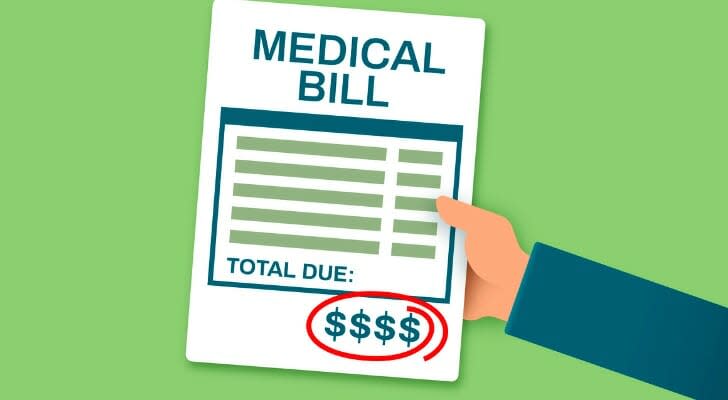Which Americans Are Most At Risk of Having Medical Bills Drain Their Retirement Income?
Retirees face sizable out-of-pocket costs for premiums, copays and uncovered services. One way to gauge this burden is to look at how much these medical costs eat into their Social Security benefits and other income. Here’s a look at how much these expenses will reduce your retirement income and some options you have to ameliorate those reductions. A financial advisor can help you protect your retirement from medical and other expenses.
How Much Medical Costs Cut Into Retiree Income
Retirement income can come from various sources. The most well known is Social Security, but it can also come from annuities and other insurance products, tax-advantaged plans like IRAs and 401(k)s, profit-sharing plans and the sale of assets, including securities. Despite the variety of sources for income retirees can draw from, that income can take a major hit from medical expenses.
The Center for Retirement Research at Boston College analyzed data from the 2018 Health and Retirement Study to calculate the share of Social Security benefits and total income available for non-medical spending. The center also explored how this measure differs by gender, age, health status, income and supplemental insurance coverage.
What researchers found is that for the median retiree, out-of-pocket medical costs, including premiums, cost-sharing and uncovered services (excluding long-term care), leave only 75% of Social Security benefits available for other expenses. That percentage is lower for women and those in low-income households.
If you’re ready to be matched with local advisors that can help you achieve your financial goals, get started now.
Who Gets Hit the Hardest?
For women, the median share remaining is 72% of Social Security benefits compared with 78% for men. That’s not because women pay substantially higher health costs than men – their premiums are slightly lower and their other out-of-pocket costs are slightly higher – but because they have substantially lower Social Security benefits. Among the highest-spending cohort of retirees, 5% of retirees have only 11% of their benefit left after out-of-pocket costs. Even at the 10th percentile, retirees spend all but a third of their benefit on out-of-pocket costs.
The culprit? Premiums for Medicare Parts B – which are rising – Part D, Medicare Advantage and supplemental plans, including retiree healthcare insurance, comprise the biggest share of medical spending for most retirees, except those with the highest spending.
How to Cut Healthcare Costs
There are various ways to reduce medical expenses, but three stand out.
Eating and exercise. Exercise and a balanced diet low in salts, saturated fats and sugars can keep you fit and slim. Doing so can also prevent diabetes, heart disease, obesity and will also keep your immune system strong. It may seem like a daunting task, but even a little bit of exercise each day can have profound impacts. Recent research suggests that short periods of intense exertion followed by periods of rest can dramatically increase your fitness level. Even seven-minute workouts have been shown to positively impact your health.
Eating a primarily plant-based diet while adding small amounts of meat (flexitarianism) and dairy has numerous proven benefits:
Losing excess weight and maintaining your ideal weight
Putting less strain on the environment
Taming your cravings for junk food and constant snacking
Stretching your dollar
Stop smoking. You know how terrible cigarettes are for your health and how expensive that pack is. Whatever you have to do to stop the habit, it will be worth it not only for your heart and lungs, but also financially. You can potentially avoid healthcare costs and save money daily. If you are a smoker, you can start saving money instantly by choosing not to smoke. Everyone who loves you will breathe easier, as will you and your wallet.
Flexible spending accounts. Contributing to a flexible spending account (FSA) can help you pay out-of-pocket medical expenses when you need to, and the FSA is federal and Social Security tax-free. In some cases, FSA’s even evade local and state income taxes. Check with your employer to see if this is an option for you.
Bottom Line

Boston College’s Center for Retirement Research found that with a substantial portion of retirees’ income going to medical costs, their finances are more precarious than Social Security benefit levels alone might suggest. With out-of-pocket healthcare expenditures cutting available retirement income and Part B premiums rising, it is understandable why many retirees may feel that making ends meet is difficult. Fortunately, there are no-cost options retirees can use to ease the financial squeeze.
Tips on Retirement
Cutting medical costs is only half the battle; increasing income is the other half. A financial advisor can help you boost your income. Finding a qualified financial advisor doesn’t have to be hard. SmartAsset’s free tool matches you with up to three financial advisors who serve your area, and you can interview your advisor matches at no cost to decide which one is right for you. If you’re ready to find an advisor who can help you achieve your financial goals, get started now.
Use SmartAsset’s free retirement calculator to see how you’re doing in preparing for retirement.
Don’t miss out on news that could impact your finances. Get news and tips to make smarter financial decisions with SmartAsset’s semi-weekly email. It’s 100% free and you can unsubscribe at any time. Sign up today.
For important disclosures regarding SmartAsset, please click here.
Photo credit: ©iStock.com/Nuthawut Somsuk, ©iStock.com/filo, ©iStock.com/TarikVision
The post How Much Retirement Income You’ll Have After Paying Medical Expenses appeared first on SmartAsset Blog.


